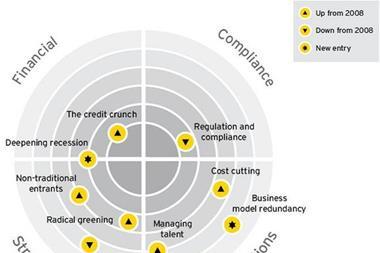Sue Copeman looks at the findings of a survey measuring brokers’ opinions of commercial insurers in the UK
StrategicRISK’s survey of your opinions on the insurers and brokers that excelled in 2008 in order to identify the winners in those respective categories for our 2009 StrategicRISK European Risk Management Awards has now closed. So without any fear of influencing results, we can now look at the findings of another survey, measuring brokers’ opinions of commercial insurers in the UK.
Last year, our sister publication Insurance Times conducted a survey of service to brokers by commercial insurers in the UK. Each respondent was asked to rate each insurer he or she dealt with on five key aspects of service: quick access to decision-makers; underwriting expertise and flexibility quality of cover speed and accuracy of documentation and speed and fairness of claims handling.
For each aspect of service, brokers were also asked to say which insurer they used was performing best, and which worst – and briefly to explain their answers. We also asked brokers which of their insurers managed the relationship best, which had improved most in the past year and which were showing the most – and least – appetite for business. This frank, open commentary added muscle to the basic analysis.
Results
This year, Chubb elbowed past Hiscox to the top of the table, registering the highest scores of any big-30 insurer on access, on underwriting, on quality of cover and on claims handling. Hiscox was close behind, however, and was the only other insurer to bag – albeit just barely – a first class overall score.
QBE took third place for the second year running, while Travelers and Ecclesiastical also recorded strong showings.
On claims, insurers need to act efficiently and with honour. When a client’s business has been burned, burgled, flooded or sued, insurers can bank up valuable broker goodwill by assigning ownership of that claim to a named staff member, communicating proactively – and paying up promptly. Claims, as one senior London-based broker put it, are ‘the shop-window of the industry’.
Business appetite can be a sore point. Quite rationally, not every insurer wants to write much in a soft market. Brokers can understand that. But they hate wasting time chasing an insurer, only to get a ‘no quote’ but no explanation. Several insurers were failing to give their brokers a clear sense of the risks for which they were competitive – and were wasting lucrative opportunities as a result.
Relationship management matters too. Brokers are social folk and like to know their underwriters. Insurers that employed lightweight relationship managers to go through the motions got little credit, we found. But those that were investing the effort to build client-focused partnerships with their brokers, backed up by solid professional service, were seeing their books swell.
In context
Brokers’ opinions of insurers might well not correlate to those of clients. And the results of a UK survey of brokers are likely to be very different from those of risk managers in Europe’s largest companies. For UK insurers, however, the results of this survey will be extremely interesting, not least because of the wealth of comment from brokers as to why some insurers did not make the grade in serving their clients.
Placing insurance may not be the top priority for risk managers in Europe’s leading companies. Managing risk is the prime focus and insurance is just one tool in accomplishing this. But even these risk managers need to know that they have objective and good advice from their insurance team – both brokers and insurers.
The current economic situation has focused all our minds on value for money. Insurers and brokers have to come up to the table and prove that they can deliver. Personal relationships are important – clearly it helps if you are all talking the same language – but it will be hard for risk managers to defend decisions based on relationships alone in the board room.
A co-ordinated approach
In the current horrific economic climate, risk management has the chance to score more than ever before. Europe’s risk managers need to demonstrate that they are ahead of the game. Perhaps this means not only looking at managing their own risks but also assessing how these risks will affect competitive companies and how they can leverage advantage from their skills.
This really is a time when risk managers can turn risk into opportunity. But having said that, it’s also important that the ‘nuts and bolts’ are there. They need to be sure of a secure and reliable back-up in the insurance arena.


















No comments yet